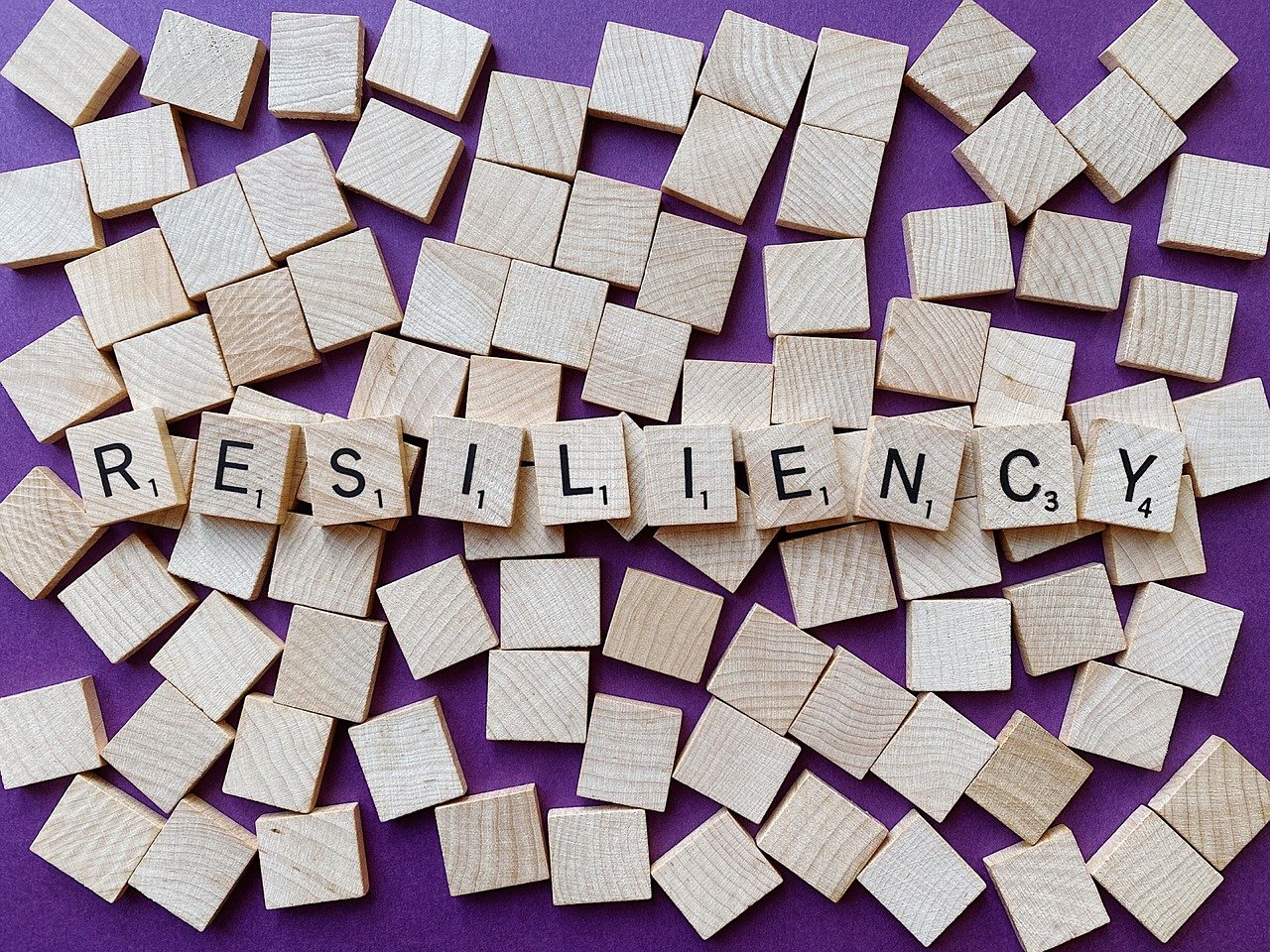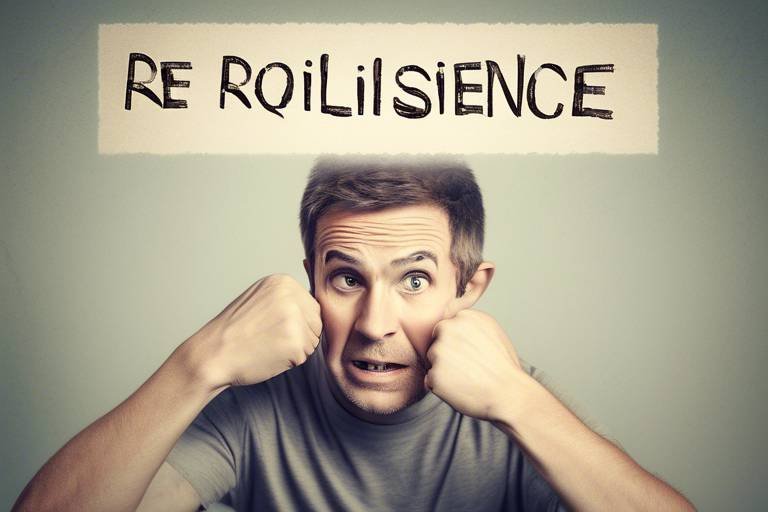How to Develop Resilience Skills in Adults?
In today's fast-paced world, the ability to bounce back from challenges is more important than ever. But what does it really mean to be resilient? Resilience is not just about enduring hardships; it's about thriving despite them. Imagine being a rubber band that stretches but never breaks. That’s the essence of resilience! In this article, we will explore effective strategies and techniques for adults to build resilience skills, emphasizing the importance of mental toughness and adaptability in facing life's myriad challenges.
Resilience is defined as the capacity to recover quickly from difficulties. Think of it as your mental shield against life's storms. It’s not just a trait you’re born with; it’s a skill you can develop over time. Understanding resilience involves recognizing its significance in our lives. It’s like having a toolbox filled with tools that help you navigate through stress, setbacks, and unexpected changes. The psychological traits that contribute to a resilient mindset include optimism, emotional regulation, and the ability to seek help when needed. These traits act as the foundation upon which resilience is built.
Building resilience is crucial for maintaining mental health and overall well-being. Why is this so important? Because resilience impacts every aspect of our lives, from personal relationships to professional endeavors. A resilient person is better equipped to manage stress, adapt to change, and recover from setbacks. For instance, when faced with a job loss, a resilient individual is likely to view it as an opportunity for growth rather than a devastating failure. This shift in perspective can lead to better decision-making and improved mental health.
Resilience is shaped by a myriad of factors, including genetics, environment, and personal experiences. Understanding these elements can help us identify areas for growth. For example, consider how your upbringing and social support systems have influenced your ability to cope with challenges. Let’s break down these factors:
Research suggests that genetics can play a role in resilience. Some individuals may be predisposed to handle stress better than others due to their biological makeup. This doesn’t mean that if you weren’t born resilient, you can’t become resilient. It simply means that some people might have a head start. Think of it like running a race; some athletes may have a natural advantage, but with training and determination, anyone can improve their performance.
The environment in which we live significantly affects our resilience. Supportive relationships and community resources can enhance an adult's ability to recover from challenges. For instance, having a friend to talk to during tough times or access to mental health resources can make a world of difference. A nurturing environment acts like a safety net, catching you when you stumble. It’s essential to cultivate relationships that foster resilience, as they can provide the encouragement and support needed to face life’s hurdles.
Now that we understand what resilience is and what influences it, let’s dive into practical strategies for building personal resilience. Developing resilience is akin to training for a marathon; it requires consistent effort and dedication. Here are a few techniques adults can implement to foster their resilience:
- Shift Your Mindset: Learn to view challenges as opportunities for growth.
- Emotional Regulation: Practice techniques to manage your emotions effectively.
- Strong Coping Mechanisms: Develop healthy ways to cope with stress, like exercise or creative outlets.
One of the most effective ways to enhance resilience is through mindfulness practices. Techniques such as meditation and deep breathing can help individuals stay grounded during stressful situations. Imagine being in the eye of a storm, calm and centered while chaos swirls around you. That’s the power of mindfulness!
Engaging in mindfulness can lead to improved emotional regulation and reduced anxiety. When you practice mindfulness, you train your brain to focus on the present moment, which can prevent overwhelming feelings of stress. This practice helps you become more aware of your thoughts and feelings, allowing you to respond rather than react to challenges. The specific benefits of mindfulness in building resilience include:
- Enhanced emotional awareness
- Increased focus and concentration
- Better stress management
Integrating mindfulness into daily routines is essential for long-term resilience. Here are some practical tips for making mindfulness a part of your everyday life:
- Start your day with a few minutes of meditation.
- Practice deep breathing exercises during breaks.
- Engage in mindful walking or eating.
By incorporating these practices, you’ll create a strong foundation for resilience that can help you navigate life’s ups and downs with greater ease.
Q: Can anyone develop resilience?
Yes, resilience is a skill that can be developed over time with practice and dedication.
Q: How long does it take to build resilience?
Building resilience is a continuous process that varies for each individual. Consistent effort over time yields the best results.
Q: Are there specific exercises to improve resilience?
Absolutely! Mindfulness practices, journaling, and seeking social support are great ways to enhance resilience.

Understanding Resilience
Resilience is often described as the ability to bounce back from adversity, but it’s so much more than just getting back up after being knocked down. Think of resilience as a mental rubber band; when stretched, it can expand and adapt to the pressures and challenges of life, but it can also return to its original shape. This ability to recover and adapt is crucial for navigating the inevitable ups and downs we all face. In essence, resilience is about mental toughness and the capacity to maintain a sense of balance and perspective even when the going gets tough.
But why is resilience so significant? Well, it’s not just about surviving tough times; it’s about thriving despite them. Resilient individuals possess certain psychological traits that enable them to cope effectively with challenges. These traits include optimism, emotional regulation, and a strong sense of purpose. When faced with obstacles, resilient people are more likely to view them as temporary setbacks rather than insurmountable barriers. This shift in perspective can be a game-changer, allowing individuals to approach challenges with a sense of confidence and determination.
Moreover, resilience isn’t a fixed trait; it can be developed and strengthened over time. Just like building muscle, enhancing resilience requires consistent effort and practice. By understanding the components that contribute to resilience, adults can take proactive steps to cultivate these qualities in themselves. For instance, engaging in positive self-talk, setting realistic goals, and seeking social support are all effective strategies for building resilience. It’s about creating a toolkit of skills that can be drawn upon during times of stress.
In summary, understanding resilience involves recognizing it as a dynamic process that encompasses both the ability to recover from difficulties and the capacity to grow through them. It’s not merely about enduring hardship but also about emerging from it stronger and more capable. By fostering resilience, adults can enhance their overall well-being, improve their mental health, and navigate life’s challenges with greater ease and effectiveness.

The Importance of Resilience
Building resilience is not just a trendy topic; it's a fundamental skill that can transform how we navigate the ups and downs of life. Imagine life as a rollercoaster, filled with thrilling highs and gut-wrenching lows. Resilience is what keeps us strapped in and ready to enjoy the ride, no matter how bumpy it gets. In today’s fast-paced world, where challenges come at us from all angles—be it at work, in relationships, or through personal struggles—having a resilient mindset is crucial for maintaining our mental health and overall well-being.
When we talk about resilience, it’s essential to recognize its impact on both personal and professional lives. For instance, individuals with higher resilience are often better equipped to handle stress and bounce back from setbacks. This adaptability not only helps in managing daily pressures but also fosters a sense of confidence and self-efficacy. Think about it: when you face a challenge and manage to overcome it, you build a reservoir of strength that you can draw upon in future difficulties. This cycle of facing challenges and emerging stronger is what makes resilience so vital.
Furthermore, resilience is linked to several key benefits that can enhance our lives significantly. Here are some of the most notable impacts:
- Improved Mental Health: Resilience helps in reducing symptoms of anxiety and depression. By developing coping strategies, individuals can manage their emotions more effectively.
- Better Relationships: Resilient people tend to communicate better and handle conflicts more constructively, leading to healthier relationships.
- Enhanced Performance: In the workplace, resilience leads to increased productivity, creativity, and the ability to adapt to changes or challenges.
In essence, resilience acts as a buffer against the inevitable stresses of life. It empowers us to approach challenges with a positive mindset and equips us with the tools to overcome obstacles. So, whether you're facing a personal crisis or navigating workplace challenges, remember that resilience is your ally. It’s not merely about enduring difficulties; it’s about thriving in spite of them. By fostering resilience, we can unlock our full potential and lead more fulfilling lives.
Q: What is resilience?
A: Resilience is the ability to recover from setbacks, adapt well to change, and keep going in the face of adversity.
Q: Why is resilience important?
A: Resilience is crucial for mental health and well-being as it helps individuals manage stress and navigate life's challenges more effectively.
Q: Can resilience be developed?
A: Yes, resilience can be developed through various strategies, including mindfulness, emotional regulation, and building strong support systems.

Factors Influencing Resilience
When it comes to resilience, it’s not just about having a strong will or a positive attitude. Several factors come into play that can either bolster or hinder our ability to bounce back from life's challenges. Understanding these factors is crucial for anyone looking to enhance their resilience skills. So, what really influences resilience?
First off, let’s talk about genetics. Believe it or not, our DNA can have a say in how resilient we are. Studies suggest that certain genetic traits can predispose individuals to be more adaptable in the face of adversity. For instance, some people may have a genetic makeup that allows them to handle stress more effectively, while others may find themselves overwhelmed. However, genetics is just one piece of the puzzle.
Next, we have environmental factors. The surroundings we grow up in and the community we are part of play a significant role in shaping our resilience. A nurturing environment, filled with supportive relationships and resources, can provide the safety net we need to recover from setbacks. For example, adults who have a strong support system—friends, family, or colleagues—often find it easier to cope with stress. On the flip side, those who lack such support may struggle more during tough times.
Additionally, personal experiences contribute to resilience. Each challenge we face is like a workout for our emotional muscles; the more we encounter and overcome, the stronger we become. This is why someone who has faced significant hardships may develop a robust sense of resilience over time. It’s akin to building a muscle: the more you lift weights, the stronger you get. Similarly, overcoming life's hurdles can enhance our ability to handle future challenges.
To sum it up, resilience is influenced by a combination of genetic predispositions, environmental support, and personal experiences. It’s a dynamic interplay that shapes how we respond to stress and adversity. By recognizing and understanding these factors, we can take proactive steps to foster resilience in ourselves and others.
- What are the key factors that influence resilience? Resilience is influenced by genetics, environmental support, and personal experiences.
- Can resilience be developed over time? Absolutely! Resilience can be cultivated through experiences and intentional practices.
- How does having a support system enhance resilience? A strong support system provides emotional backing and resources, making it easier to cope with challenges.

Genetic Influences
When we talk about resilience, it’s essential to recognize that not all of it is purely a product of our environment or experiences. In fact, play a significant role in shaping how we respond to stress and adversity. Research indicates that certain genetic factors can predispose individuals to be more resilient than others. This means that some people may have a biological edge when it comes to bouncing back from life's challenges.
For instance, studies have shown that variations in genes related to the production of neurotransmitters, such as serotonin and dopamine, can affect mood regulation and stress response. These neurotransmitters are crucial in how we perceive and react to stressful situations. If you have a genetic makeup that promotes a balanced production of these chemicals, you may find it easier to maintain emotional stability during tough times.
Moreover, the concept of epigenetics comes into play here. This field of study explores how environmental factors can influence gene expression, meaning that while you might inherit certain traits, your environment can also modify how those traits manifest. For example, an individual with a genetic predisposition for resilience might not fully realize that potential if they grow up in a highly stressful or unsupportive environment.
To illustrate this further, consider the following table that summarizes some of the genetic factors associated with resilience:
| Genetic Factor | Influence on Resilience |
|---|---|
| Serotonin Transporter Gene (5-HTTLPR) | Affects mood regulation and emotional response to stress. |
| Brain-Derived Neurotrophic Factor (BDNF) | Promotes brain health and adaptability, enhancing coping mechanisms. |
| Dopamine Receptor Genes | Influence motivation and reward processing, impacting resilience levels. |
Understanding the genetic influences on resilience not only helps in recognizing why some individuals may handle stress better than others but also opens up avenues for intervention. It suggests that resilience isn’t solely a matter of willpower or mental toughness; it’s also about the biological wiring that each person brings to the table. This knowledge can empower individuals to seek out resources and support systems that can help them cultivate resilience, regardless of their genetic predispositions.
In conclusion, while genetics play a crucial role in resilience, they do not determine it entirely. The interplay between our genes and our environment creates a complex web of influences that shape our ability to cope with life's challenges. By understanding these genetic influences, we can better appreciate the multifaceted nature of resilience and the various pathways to developing it.

Environmental Factors
The environment we inhabit plays a pivotal role in shaping our resilience. Think of resilience as a plant; it needs the right conditions to thrive. If you place a delicate flower in a harsh, unforgiving climate, it’s unlikely to flourish. Similarly, adults require a nurturing environment to develop and strengthen their resilience skills. This nurturing can come from various sources, including family, friends, colleagues, and community resources. When individuals are surrounded by supportive relationships, they are more likely to bounce back from setbacks.
Social support is one of the most significant environmental factors contributing to resilience. Having a network of people to lean on during tough times can provide not only emotional comfort but also practical assistance. When we face challenges, knowing that someone has our back can make a world of difference. It’s like having a safety net; when we stumble, we don’t fall too far. The presence of positive relationships can enhance our ability to cope with stress, making us more adaptable and mentally tough.
Moreover, community resources such as mental health services, recreational activities, and educational programs can significantly bolster resilience. These resources provide individuals with tools and strategies to manage stress and navigate life's adversities. For instance, community centers that offer workshops on stress management or resilience training can empower adults to develop coping mechanisms and gain new perspectives. Access to these resources is crucial, especially in times of crisis when the need for support is heightened.
Consider the following factors that contribute to a supportive environment:
- Positive Relationships: Connections with family and friends that foster trust and open communication.
- Access to Resources: Availability of mental health services, educational opportunities, and community programs.
- Encouraging Environment: Spaces that promote growth, learning, and emotional well-being.
In summary, the environment we create for ourselves and the support systems we build are crucial in developing resilience. By nurturing positive relationships and seeking out community resources, adults can enhance their ability to face life's challenges head-on. Just as a well-tended garden flourishes, so too can our resilience grow when we cultivate a supportive and enriching environment.

Building Personal Resilience
Building personal resilience is like constructing a sturdy bridge over a turbulent river; it requires a solid foundation and ongoing maintenance. Resilience isn't just about enduring hardships; it's about thriving despite them. To cultivate this essential skill, adults can adopt various strategies that focus on mindset shifts, emotional regulation, and developing strong coping mechanisms. One of the first steps is to embrace a growth mindset. This involves viewing challenges as opportunities for growth rather than insurmountable obstacles. When you shift your perspective, you open yourself up to learning and adapting, which are key components of resilience.
Another vital aspect of building resilience is emotional regulation. Life can throw curveballs that trigger a whirlwind of emotions—stress, anxiety, frustration, you name it. The ability to manage these feelings effectively is crucial. Techniques such as deep breathing exercises, journaling, or even talking with a trusted friend can help you process emotions and reduce their intensity. For example, when faced with a stressful situation, taking a few moments to breathe deeply can ground you and provide clarity, allowing you to respond rather than react impulsively.
Additionally, developing strong coping mechanisms is essential. This means identifying what works best for you when faced with adversity. Some people find solace in physical activities, while others prefer creative outlets like painting or writing. It’s important to explore various methods and discover what resonates with you. Here are a few effective coping strategies:
- Physical Activity: Engaging in regular exercise can boost your mood and help alleviate stress.
- Social Connections: Building a support network of friends and family can provide emotional backing during tough times.
- Mindfulness Practices: Techniques such as meditation can help you stay present and reduce anxiety.
Moreover, setting realistic goals and breaking tasks into manageable steps can foster resilience. When you achieve small milestones, it builds confidence and reinforces the belief that you can overcome challenges. It’s like climbing a mountain; instead of fixating on the peak, focus on reaching the next ledge. Remember, resilience is not a one-time achievement but a continuous journey. Regularly reflecting on your experiences and learning from them can enhance your resilience over time.
In conclusion, building personal resilience is a multifaceted process that involves mindset shifts, emotional regulation, and the development of effective coping strategies. By actively engaging in these practices, adults can strengthen their ability to bounce back from adversity, ultimately leading to a more fulfilling and balanced life.
Q: What is resilience?
A: Resilience is the ability to recover from setbacks, adapt well to change, and keep going in the face of adversity.
Q: Can resilience be learned?
A: Yes, resilience can be developed through various strategies and practices, such as mindfulness, emotional regulation, and building strong support networks.
Q: How long does it take to build resilience?
A: Building resilience is a personal journey that varies for each individual. It requires consistent effort and practice, but over time, you will notice improvements.
Q: Are there specific exercises to improve resilience?
A: Yes, exercises like journaling, deep breathing, engaging in physical activity, and practicing mindfulness can significantly enhance your resilience.

Mindfulness and Resilience
In today's fast-paced world, the concept of mindfulness has gained significant traction, especially when it comes to enhancing resilience. But what exactly is mindfulness? At its core, mindfulness is the practice of being fully present and engaged in the moment, free from distractions or judgment. This practice can serve as a powerful tool for adults looking to build their resilience skills. By fostering a greater awareness of our thoughts and emotions, mindfulness allows us to navigate life's challenges with clarity and composure.
Imagine facing a stressful situation, like a looming deadline at work or a personal crisis. Instead of reacting impulsively, mindfulness encourages you to pause, breathe, and assess the situation calmly. This ability to respond rather than react can be the difference between feeling overwhelmed and maintaining control. Mindfulness helps cultivate a sense of mental toughness, enabling individuals to bounce back from setbacks more effectively. It’s like having an emotional safety net that catches you when you stumble, allowing you to regain your footing.
Research has shown that incorporating mindfulness practices into daily life can lead to numerous benefits for emotional well-being. For instance, individuals who practice mindfulness regularly report:
- Improved emotional regulation: Mindfulness helps in recognizing and managing emotions, reducing the likelihood of emotional outbursts.
- Reduced anxiety: By focusing on the present, individuals can diminish worries about the future, leading to lower anxiety levels.
- Enhanced focus and concentration: Mindfulness practices improve attention span, making it easier to tackle tasks without getting sidetracked.
These benefits are crucial for building resilience. When we can regulate our emotions and manage stress, we are better equipped to face challenges head-on. It’s like sharpening a tool; the more refined your skills are, the more effectively you can handle whatever comes your way.
So, how can you incorporate mindfulness into your daily routine? Here are some practical tips:
- Start small: Begin with just a few minutes of mindfulness meditation each day. Gradually increase the duration as you become more comfortable with the practice.
- Mindful breathing: Take a moment to focus on your breath whenever you feel stressed. Inhale deeply through your nose, hold for a few seconds, and exhale slowly through your mouth.
- Mindfulness in daily activities: Practice mindfulness while doing everyday tasks, such as eating or walking. Pay attention to the sensations, smells, and sounds around you.
Integrating these practices into your life can significantly enhance your resilience. In moments of stress, you’ll find yourself better equipped to handle challenges with a clear mind and a calm heart. Remember, resilience is not just about enduring difficulties; it’s about thriving despite them. Mindfulness is a key ingredient in that journey, helping you to not just survive, but to truly flourish.
| Question | Answer |
|---|---|
| What is mindfulness? | Mindfulness is the practice of being fully present and engaged in the moment, allowing for greater awareness of thoughts and emotions. |
| How does mindfulness improve resilience? | Mindfulness helps individuals manage emotions and stress, enabling them to respond thoughtfully to challenges rather than reacting impulsively. |
| Can mindfulness be practiced anywhere? | Yes! Mindfulness can be practiced in various settings—at home, work, or even while commuting—by focusing on your breath or engaging fully in your current activity. |

Benefits of Mindfulness
Mindfulness is more than just a trendy buzzword; it's a powerful practice that can significantly enhance our resilience. When we talk about mindfulness, we're referring to the ability to stay present and fully engage with the moment, without judgment. This practice can lead to a profound transformation in how we respond to stress and adversity. But what are the specific benefits of mindfulness that contribute to building resilience? Let's dive into some of the most impactful advantages.
First and foremost, mindfulness improves emotional regulation. By practicing mindfulness, individuals learn to observe their thoughts and feelings without becoming overwhelmed by them. This skill is crucial when facing challenging situations, as it allows for a more measured response rather than a knee-jerk reaction. Imagine being in a heated discussion; instead of reacting impulsively, mindfulness enables you to pause, reflect, and respond thoughtfully. This shift can prevent conflicts from escalating and help maintain healthy relationships.
Another significant benefit of mindfulness is its ability to reduce anxiety. Many adults grapple with anxiety in their daily lives, which can hinder their ability to cope with stress. Mindfulness techniques, such as meditation and deep breathing, help calm the mind and body, allowing individuals to manage their anxiety more effectively. When anxiety levels decrease, resilience can flourish, making it easier to face life's inevitable challenges. In fact, studies have shown that regular mindfulness practice can lead to a decrease in anxiety symptoms, providing a sense of peace amidst chaos.
Moreover, mindfulness fosters a greater sense of self-awareness. When we become more attuned to our thoughts and feelings, we can identify patterns that may be holding us back. This awareness is the first step toward change. For instance, if you notice that you often react defensively in stressful situations, mindfulness can help you recognize this pattern and choose a different response. By understanding ourselves better, we empower ourselves to make choices that enhance our resilience.
To illustrate the benefits of mindfulness, consider the following table that summarizes its key advantages:
| Benefit | Description |
|---|---|
| Emotional Regulation | Helps individuals manage their emotions and respond thoughtfully to stress. |
| Anxiety Reduction | Decreases anxiety levels, allowing for a calmer approach to challenges. |
| Increased Self-Awareness | Enhances understanding of personal thought patterns and behaviors. |
Lastly, mindfulness cultivates a sense of connection. In a world that often feels isolating, being present with ourselves can help us connect with others on a deeper level. When we practice mindfulness, we become more empathetic and compassionate, not only toward ourselves but also toward those around us. This connection can provide a strong support network, which is vital for resilience. After all, having people to lean on during tough times can make all the difference.
In summary, the benefits of mindfulness are vast and varied. From improving emotional regulation and reducing anxiety to fostering self-awareness and connection, mindfulness serves as a powerful tool in building resilience. By incorporating mindfulness practices into our daily routines, we can equip ourselves with the skills needed to bounce back from life's challenges with grace and strength.
- What is mindfulness? Mindfulness is the practice of being present and fully engaged with the current moment, without judgment.
- How does mindfulness help with resilience? Mindfulness enhances emotional regulation, reduces anxiety, increases self-awareness, and fosters connection, all of which contribute to greater resilience.
- Can anyone practice mindfulness? Yes! Mindfulness can be practiced by anyone, regardless of age or background. It’s about finding what works best for you.
- How can I start practicing mindfulness? You can start with simple techniques like deep breathing, meditation, or mindful walking. Even dedicating a few minutes each day can make a significant difference.

Incorporating Mindfulness into Daily Life
In today's fast-paced world, where distractions lurk at every corner, incorporating mindfulness into our daily lives can feel like trying to catch smoke with your bare hands. However, with a little practice and intention, it can become as natural as breathing. Mindfulness isn't just about sitting cross-legged on a yoga mat; it's about being present in the moment, appreciating the little things, and cultivating a sense of awareness that can transform the mundane into the extraordinary.
One of the simplest ways to start integrating mindfulness is by embracing the concept of mindful moments. This means taking brief pauses throughout your day to check in with yourself. For instance, when you wake up in the morning, instead of immediately reaching for your phone, take a moment to notice your surroundings. Feel the sheets against your skin, listen to the sounds outside, and appreciate the new day ahead. These small acts of awareness can set a positive tone for the rest of your day.
Another effective strategy is to incorporate mindfulness into routine activities. Whether you're brushing your teeth, washing the dishes, or commuting to work, try to focus completely on the task at hand. Notice the sensations, the smells, and even the sounds. When your mind wanders, gently bring it back to the present. This practice not only enhances your concentration but also allows you to experience life more fully.
To further embed mindfulness into your life, consider establishing a dedicated time for mindfulness practices. This could be as simple as setting aside 10 minutes each day for meditation or deep breathing exercises. Creating a cozy space in your home, free from distractions, can transform this time into a sanctuary of peace. Use this time to focus on your breath, letting go of any thoughts that arise, and simply being in the moment.
Additionally, you can utilize technology to your advantage. There are numerous apps available that offer guided meditations and mindfulness exercises. These can be particularly helpful for beginners who may feel overwhelmed by the idea of practicing mindfulness alone. Some popular apps include Headspace, Calm, and Insight Timer. Just remember, the goal isn't to achieve perfection; it's about progress and consistency.
Lastly, don't underestimate the power of community. Joining a mindfulness group or attending workshops can provide the support and encouragement needed to deepen your practice. Sharing experiences with others can also lead to valuable insights and new techniques that you might not have considered. Remember, mindfulness is a journey, not a destination.
In summary, incorporating mindfulness into your daily life doesn't have to be a daunting task. By starting with small, intentional changes and gradually building a routine, you can cultivate a more mindful existence. The beauty of mindfulness lies in its simplicity and accessibility; it’s all about being present and appreciating the moment, no matter how ordinary it may seem.
- What is mindfulness? Mindfulness is the practice of being fully present and engaged in the moment, without judgment. It involves focusing your attention on your thoughts, feelings, and surroundings.
- How can I practice mindfulness daily? You can practice mindfulness by taking short breaks during your day to focus on your breath, engaging in mindful eating, or dedicating time for meditation.
- Do I need special training to be mindful? No special training is required! Mindfulness can be practiced by anyone, anywhere, at any time. Start with simple techniques and build from there.
- How long should I practice mindfulness each day? Even a few minutes of mindfulness can be beneficial. Aim for at least 5-10 minutes daily, gradually increasing the time as you become more comfortable with the practice.
Frequently Asked Questions
- What is resilience and why is it important?
Resilience is the ability to bounce back from challenges and adversity. It's crucial because it helps individuals cope with stress, adapt to change, and maintain a positive outlook even in tough times. Think of it as a mental spring that allows you to recover quickly from life's setbacks.
- How can I develop resilience skills?
Developing resilience skills involves several strategies, such as cultivating a positive mindset, practicing emotional regulation, and building strong coping mechanisms. Engaging in activities like mindfulness and deep breathing can also significantly enhance your ability to handle stress.
- What role does mindfulness play in building resilience?
Mindfulness plays a vital role in enhancing resilience by helping individuals stay present and grounded during stressful situations. By practicing mindfulness techniques, like meditation, you can improve emotional regulation and reduce anxiety, making it easier to face challenges head-on.
- Are there specific mindfulness practices I can incorporate into my daily life?
Absolutely! You can integrate mindfulness into your daily routine by setting aside time for meditation, practicing deep breathing exercises, or even engaging in mindful walking. The key is to find small moments throughout your day to focus on the present and cultivate awareness.
- What factors influence resilience in adults?
Resilience in adults is influenced by a mix of genetic, environmental, and personal experiences. Genetics can play a part in how we respond to stress, while a supportive environment and positive relationships can significantly boost our resilience levels.
- Can resilience be learned or developed over time?
Yes, resilience can definitely be learned and developed over time. Just like building muscle, it requires practice and commitment. By consistently applying resilience-building strategies, you can strengthen your ability to cope with life's challenges.
- How does resilience impact my personal and professional life?
Resilience can have a profound impact on both personal and professional aspects of life. It enables you to navigate stress more effectively, maintain healthy relationships, and adapt to changes in the workplace, ultimately leading to improved well-being and success.



















